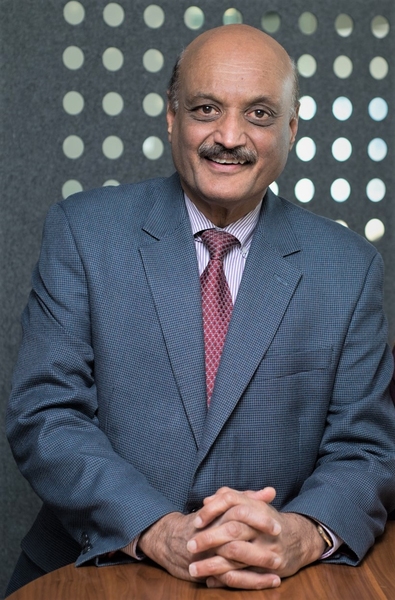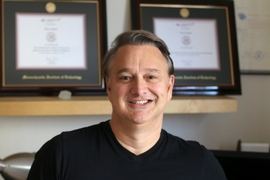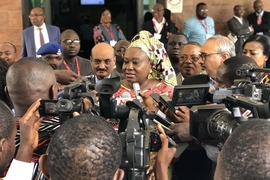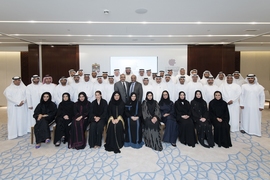MIT Professional Education, housed under the School of Engineering, is the arm of MIT that provides access to MIT knowledge and expertise to thousands of professionals around the world via education programs designed for them.
Bhaskar Pant, executive director of MIT Professional Education, says he didn’t consciously set out to bring more diversity to the program when he stepped into his role in 2008. But, as he puts it, a commitment to diversity and multiculturalism is in his “DNA.”
Pant was born of Indian heritage in Zambia; he has lived on four continents, and is fluent in English, Hindi, and Gujarati, with a working knowledge of French. During several decades in the private sector, he worked as an executive on four continents with vastly different cultural contexts, and has seen multiple, vivid examples of how a commitment to inclusion and a respect for cultural differences can have a positive impact on the work of both individuals and institutions.
This lifetime of experiences shaped the ethic he brought to MIT, where he has dramatically expanded the global reach of MIT Professional Education. Soon after he assumed his role, he said to his colleagues, “We’re not really reaching out to too many people where they are located; we are focusing on those who reach out to us. Let’s make it the other way around.”
Under Pant’s leadership, the program now offers an array of MIT courses in multiple languages on multiple continents — making it a rarity among professional education programs globally. On April 8, Pant was recognized as the first-ever recipient of the national UPCEA Leadership in Diversity and Inclusive Excellence Award from the University Professional and Continuing Education Association (UPCEA), a leading association for professional, continuing, and online education in the United States.
“Having grown up in a British colony, and then living through the process of my country becoming independent, and indigenous people charting their own destiny — that experience got embedded in my life,” Pant says. “I have seen people who were oppressed, who became independent, who could then really have the freedom to reach their full personal and professional potential. I saw that diversity brought about a lot of transformative outcomes for all. So, when you have that as your background, you try to promulgate that in everything you do. It all coalesced for me at MIT. Among other accomplishments at MIT Professional Education, we’ve really been able to reach out to underserved communities around the world, particularly women. That is what satisfies me the most.”
A lifetime of experience
It’s not much of an exaggeration to say that Pant brought a world with him to MIT, and then brought MIT back out into the world.
As a boy, Pant attended racially segregated schools in what was then Northern Rhodesia, which he says fueled a desire to learn more about the people who were being kept apart legally. He moved to the U.K. to earn an advanced pre-college educational certificate, then received a full U.S. government-aided scholarship to attend engineering school at the University of Rochester, where he subsequently became president of the International Students Association. In graduate school at Indiana University, he studied communications and media, and got particularly interested in global, cross-cultural communications.
Drawing on his technical background and communications education, Pant went into technical sales at Tektronix, a leader in electronic test equipment. Next, he joined Sony America as vice president for broadcast systems, and took the opportunity to learn about Japanese language and culture. Among other roles, Pant later became the first president of Turner Broadcasting South Asia. “Constantly, I was exposed to international and intercultural communication in addressing diverse populations,” he says.
Cartoon Network was Turner Broadcasting’s most popular offering in Asia, and Pant observed the way that children could often understand English-language cartoons, even without dubbing in local language. However, Pant soon discovered that for India, he needed to switch the programming schedule for the country to not include “Cow and Chicken,” an animated series that featured a sarcastic and abrasive cow, in a country where cows are held sacred.
“Within Asia, there are so many countries with different cultures, and if you just bombard all of them with the same satellite feed, then what about regional sensitivities?” Pant asks. “Similarly, you cannot produce a product and say, ‘Why don’t we just ship it everywhere in the world, without understanding local needs and/or sensitivities?”
Bringing people together
These sorts of lessons were crucial in shaping Pant’s work at MIT. When he came to campus, he first made a point of hiring a diverse, culturally sensitive staff. Under his leadership, MIT Professional Education launched in-person courses in countries like Japan, Singapore, India, and Nigeria. Pant also launched MIT Professional Education’s innovative, hybrid online Digital Plus Programs (DPP), which removed barriers around cost, language, and location — helping to bring in many more students from countries around the world to MIT education. Only 15 percent of enrollees were female when the program launched, but that number had increased to nearly 40 percent by early 2020. The program now offers nine online courses and two professional certificate programs in multiple languages, including Spanish and Portuguese.
Pant has been mindful about cultural context when delivering courses in new countries — offering programs in a way that account for cultural differences, while also ensuring that each course embodies MIT’s values.
For programs in Dubai and Saudi Arabia, for example, Pant, with permission from the host organizers, insisted that MIT courses be open to men and women on equal terms. For a Dubai program on innovation in government, MIT Professional Education required that men and women work together at the same table — a significant departure from typical practices there. In addition to promoting gender equity, Pant says, the stipulation resulted in new ideas coming to the forefront.
“We said, ‘How are you going to have innovation if you have all this separation?’” Pant recalls. “Women started speaking up because they felt empowered, and quite frankly, they were making much more poignant points than the men. One of the assignments was to go and interview their own children, and perhaps talk to some of their teachers, and find out what was going on in primary education. Most male government officers sat around at home because they always had other people to do the work for them. We found that the women actually went and talked to the teachers after school and came back to class the next day surfacing all kinds of issues. They then came through with brilliant ideas for improvement and innovation!”
Looking ahead
Pant teaches a cultural awareness and communication workshop for MIT staff, and also one that is required for all incoming MIT international undergraduate and graduate students as part of their orientation. Ideally, Pant says, such a course should be required of all incoming MIT students, regardless of their background.
“I’m a big proponent of cross-cultural awareness and sensitivity among all citizens of MIT,” Pant says. “That should be the case, but we are not there yet. There’s still this idea that people who come from other countries need to know more about the U.S. and MIT cultures. That’s true. But if it is only that, then you’re leaving out a huge majority of the community who, quite frankly, need a lot more cultural awareness for there to be sustainable mutual respect and success.”
Pant hopes to continue increasing also the percentage of MIT Professional Education faculty members who are women, continue to offer courses in many more languages, and find new ways to reach more people around the globe. “We just celebrated a benchmark that I had set, which was to exceed touching 10,000 lives — 10,000 professionals in a year,” he says. “We just exceeded that number in the year of Covid, which is pretty phenomenal. Now, it’s up to 12,000 people.”
“Our mission at MIT is to work with others to help address the great challenges of humankind,” Pant adds. “That being the case, we need to bring into our universe many more people of varying stripes and needs from around the world. We have just got started; I look forward with my team to scale greater heights in our continuing journey to address lifelong learning needs of professionals around the world.”











